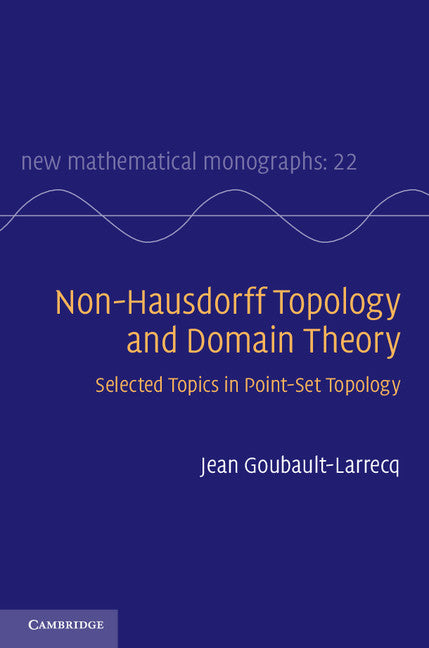Freshly Printed - allow 8 days lead
Couldn't load pickup availability
Non-Hausdorff Topology and Domain Theory
Selected Topics in Point-Set Topology
Introduces the basic concepts of topology with an emphasis on non-Hausdorff topology, which is crucial for theoretical computer science.
Jean Goubault-Larrecq (Author)
9781107034136, Cambridge University Press
Hardback, published 28 March 2013
497 pages, 46 b/w illus. 485 exercises
23.5 x 15.7 x 2.8 cm, 0.82 kg
'The presentation is highly original … [this] book brings a refreshing perspective to topology … the material has obviously been chosen with great care and the book is very well written.' Hans-Peter Künzi, Zentralblatt MATH
This unique book on modern topology looks well beyond traditional treatises and explores spaces that may, but need not, be Hausdorff. This is essential for domain theory, the cornerstone of semantics of computer languages, where the Scott topology is almost never Hausdorff. For the first time in a single volume, this book covers basic material on metric and topological spaces, advanced material on complete partial orders, Stone duality, stable compactness, quasi-metric spaces and much more. An early chapter on metric spaces serves as an invitation to the topic (continuity, limits, compactness, completeness) and forms a complete introductory course by itself. Graduate students and researchers alike will enjoy exploring this treasure trove of results. Full proofs are given, as well as motivating ideas, clear explanations, illuminating examples, application exercises and some more challenging problems for more advanced readers.
1. Introduction
2. Elements of set theory
3. A first tour of topology: metric spaces
4. Topology
5. Approximation, and function spaces
6. Metrics, quasi-metrics, hemi-metrics
7. Completeness
8. Sober spaces
9. Stably compact spaces, and compact pospaces
References
Notation index
Index.
Subject Areas: Computer science [UY], Programming & scripting languages: general [UMX], Topology [PBP], Mathematics [PB]


